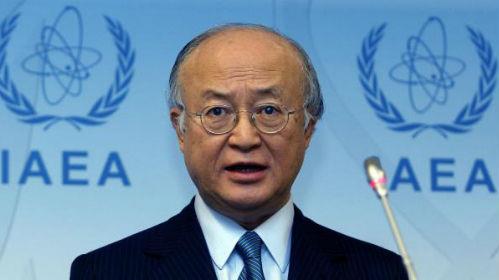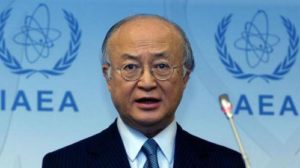
 VIENNA – The head of the United Nations nuclear agency says Iran appears to be hewing to the letter of last year’s landmark nuclear agreement but says his inspectors are stretched thin by the task of monitoring compliance across a country the size of Alaska.
VIENNA – The head of the United Nations nuclear agency says Iran appears to be hewing to the letter of last year’s landmark nuclear agreement but says his inspectors are stretched thin by the task of monitoring compliance across a country the size of Alaska.
Yukiya Amano, director general of the International Atomic Energy Agency, said the hard work of verifying the controversial pact will likely continue for years, strongly hinting that he intends to seek a third term as head of the watchdog agency to see the task through.
“It is still fragile,” Amano said of the accord during an interview at the IAEA’s Austrian headquarters. “Reaching an agreement was very important, but making it sustainable requires a lot of effort.”
Amano comments echoed the conclusions of the latest report on Iran by the IAEA.
The pact allows Iran to keep parts of its civilian nuclear infrastructure but sets strict limits on the production of fissile material that could potentially be used to make nuclear weapons.
IAEA officials have acknowledged occasional sparring with Iran over technical definitions, but even in disputed areas Iran has scrupulously avoided crossing the line so far, according to U.S. and U.N. officials knowledgeable about the issue. Iranian leaders have complained bitterly about what they see as a failure by Western powers to uphold their side of the bargain by reversing the effects of years of economic sanctions. But Amano said he has sought to avoid political controversies by focusing strictly on measurable results.
“We are not asked to verify attitude. We are asked to verify facts,” said Amano, the soft-spoken Japanese diplomat who has led the U.N. agency since 2009. “If they were smiling or if they were quite unpleasant, we don’t care.”
The task of policing the accord falls to a small band of IAEA officials who have been granted access to all of Iran’s declared nuclear facilities and production mills and given the right to inspect any suspected secret sites on short notice.
Amano said his team is still ramping up for what is already an unprecedented oversight role, hiring new staff and setting up offices while seeking to maintain a cooperative relationship with Iranian hosts.
“It is huge work. Our inspectors are stretched and they are working very hard,” Amano said. While the agency has the necessary financial resources, he said, it is “still in the process of building up” to ensure that inspectors can adequately monitor dozens of facilities ranging from uranium mines to factories that make centrifuge parts. He acknowledged the criticism leveled at the IAEA after its most recent reports on Iran contained less detail compared to the fact-rich documents the agency issued before the nuclear pact was struck.
Also missing from the IAEA’s recent reports is any mention of Iran’s past nuclear weapons research. With the implementation of the July agreement, the agency essentially closed the file on its years-long investigation into Iran’s nuclear past, issuing a report asserting that Iran had indeed conducted extensive research into nuclear-warhead design before halting the program in 2003.
Iran has never publicly acknowledged its previous weapons work, and Iranian officials appear to have gone to considerable lengths to conceal evidence of pre-2003 testing of nuclear components at its Parchin military base outside Tehran. Amano was allowed to visit the base last year, but only after Iran spent years cleaning the site and covering the soil with fresh asphalt.
Iran’s denials of past nuclear experiments are still not credible, in the IAEA’s view, he said. But, most crucially, no such work is underway at Parchin now.
Amano is entering the final year of his second term as IAEA chief, a tenure that began amid turmoil and threats of military conflict as Tehran and Washington locked horns over Iran’s rapidly advancing nuclear program. While the IAEA is officially neutral on the politics of the agreement, Amano said the previous pattern of engagement had done nothing to curb Iran’s nuclear ambitions. “Stonewalling didn’t work,” he said.
Within Viennese diplomatic circles, Amano has made no secret of his wish to seek a third term. He told The Washington Post he would like more time to lock in progress on other goals, such as bringing nuclear-based medicine and energy solutions to developing countries, and perhaps restarting nuclear inspections in North Korea, which has rapidly expanded its weapons program after kicking out IAEA inspectors in 2009. In the meantime, continuity of leadership is vital to ensure that the nascent Iran accord is implemented soundly, Amano said.
“For Iran, the job is only half done,” he said. “We need to make it sustainable.’
Source: Washington Post, 4 June 2016

